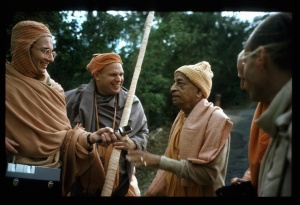CC Adi 7.11 (1975)

A.C. Bhaktivedanta Swami Prabhupada
Below is the 1996 edition text, ready to be substituted with the 1975 one using the compile form.
TEXT 11
- kṛṣṇa-mādhuryera eka adbhuta svabhāva
- āpanā āsvādite kṛṣṇa kare bhakta-bhāva
SYNONYMS
kṛṣṇa-mādhuryera—the supreme pleasure potency of Kṛṣṇa; eka—is one; adbhuta—wonderful; svabhāva—nature; āpanā—Himself; āsvādite—to taste; kṛṣṇa—the Supreme Personality of Godhead; kare—does; bhakta-bhāva—accept the form of a devotee.
TRANSLATION
The transcendental mellow of conjugal love of Kṛṣṇa is so wonderful that Kṛṣṇa Himself accepts the form of a devotee to relish and taste it fully.
PURPORT
Although Kṛṣṇa is the reservoir of all pleasure, He has a special intention to taste Himself by accepting the form of a devotee. It is to be concluded that although Lord Caitanya is present in the form of a devotee, He is Kṛṣṇa Himself. Therefore Vaiṣṇavas sing, śrī-kṛṣṇa-caitanya rādhā-kṛṣṇa nahe anya: “Rādhā and Kṛṣṇa combined together are Śrī Kṛṣṇa Caitanya Mahāprabhu.” And as Śrī Svarūpa Dāmodara Gosvāmī has said, caitanyākhyaṁ prakaṭam adhunā tad-dvayaṁ caikyam āptam: Rādhā and Kṛṣṇa assumed oneness in the form of Śrī Caitanya Mahāprabhu.